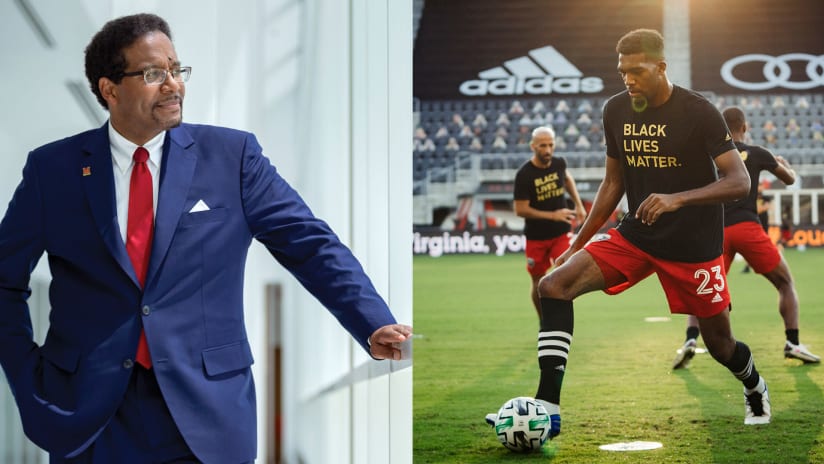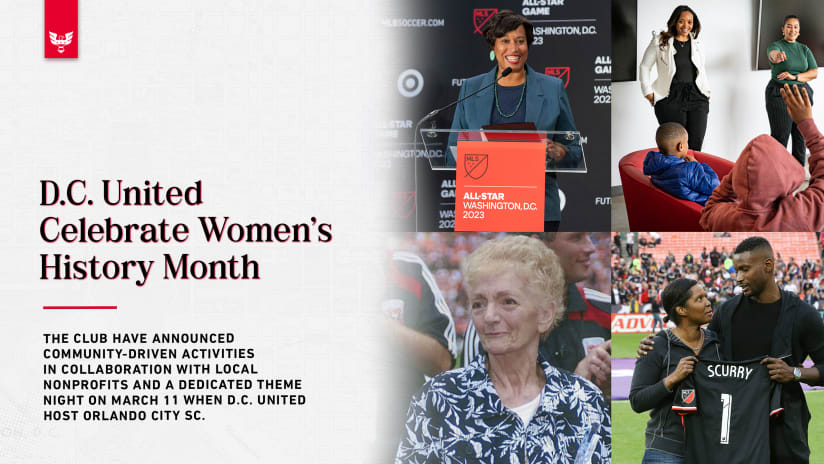June 19, 1865 marks the date on which enslaved African-Americans in Texas received word of their freedom, over two and a half years after the Emancipation Proclamation was signed into effect.
The now federally recognized holiday is a celebration of freedom, but it also serves as reminder that freedom is more than a declaration. It is a continuous struggle for accountability and truth that we all have a duty to participate in.
Ahead of Juneteenth, we sat down with defender Donovan Pines and his father, University of Maryland President, Dr. Darryll J. Pines to talk about the historical importance of the holiday and how we can leverage this day to make change in our country. Below is a lightly edited transcription of that conversation.
When did you first learn about Juneteenth?
Donovan: I learned about it in college in one of my classes at the University of Maryland. That year on Juneteenth, our professor came to class and told us today was a special day. Honestly no one really knew what the day was. I'm glad that we have a holiday and a day to really think about what happened and how Juneteenth came to be.
Dr. Pines: I grew up in a time period where folks were very cognizant of civil rights and the Civil Rights Movement of the 1960s. But similar to Donovan, I actually learned about Juneteenth in college in an African American Studies English class.
Similarly, it was sort of an epiphany to know that there were folks that should've been freed by President Lincoln's Emancipation Proclamation in January of 1863, and they were not until June 19th of the 1865. So that was a delay in their freedom, which should've been almost instantaneous.
Why do you think it took so long for Juneteenth to become a federal holiday?
Dr. Pines: The events of the past couple years, and more specifically the events of 2020 renewed the issues related to civil rights in the United States and the sanctity of our democracy. It's put pretty fine optics on social justice, the Black Lives Matter Movement, and what happened to George Floyd. Most people at the time when it happened could see what Black folks were saying regarding the deferential, negative treatment of Black people at the hands of law enforcement.
This has led to a whole resurrection regarding Juneteenth and social justice. During 2020 there was the Black Lives Matter Movement, but also important, there was a movement to recognize the past injustices that delayed the freedom of Black people. It's fascinating that it was this uprising and the reference to history and social injustice in our country that led to this new holiday to honor those who weren't free at the time.
What was it like to experience that movement in 2020 and 2021?
Donovan: It was incredible just to live in that moment. It was a really unique moment for the Black Players Coalition to be able to come together and figure out what we can do to address these matter that are going on in the outside world, because we are in the bubble. We couldn't be a part of everything that was going on in the outside world, but we also have a part to play in our community to bring all of this to fruition and address these issues.
We came together, we had a meeting one night, and made sure that we got our point across. It really made a mark and everybody was talking about it. It was a privilege to be a part of that and to get closer with the Black players on the other teams. We made more of a relationship and realized we all want to fight for the same thing.
Dr. Pines: For me, starting on July 1st as President of the University of Maryland, the George Floyd murder was May 20th of that year. Coupled with the pandemic, the murder of George Floyd and other murders that happened that year, led to a moment of reflection and a moment of opportunity. Reflection about what's the state of our country and the way it treats people–what is the role of universities in educating its populous, but also trying to make a difference in the things that it does in the community.
A week before I started, a group of Black students protested on the steps of my main administration building. And I was actually there, listening to their call to action. It wasn't an awakening for me to say 'ok, I've been called to serve as President and my job is to make the lives of all the students on campus a lot better and a lot more just.' So, I work with the Black students, as well as other constituents on campus, to really improve the environment, improve a sense of belonging, improve diversity and inclusion across the campus and programming in the curriculum.
This whole time period is an opportunity for higher education institutions to lead the way. It's also an opportunity for the United States to do better for all of its people. We must never forget the year of 2020. When these big moments happen and there are protests and movements, a lot of good can come out of that as a society.
How has Juneteenth opened up a dialogue on social and racial justice?
Donovan: In the world around us, people really don't know what's going through the minds of a minority in this country. It's helped people realize that they don't know the full experience of others and that it's okay to ask. If someone on my team wants to know how I'm feeling about an issue or how I got through a situation, I'd be happy to explain it to them. It gives me a really a big sigh of relief, because I'm giving insight to a person, and they can give that insight to the next person, and hopefully that brings change to the environment.
How can people commemorate Juneteenth?
Dr. Pines: I'm glad it's a national holiday, because it puts a marker on the calendar. For people of every walk of life, there's a signature day now that they'll have off in the summer related to something that maybe they didn't know anything about.
What I would like to see is for a person who's not of African-American perspective, to go and learn about the history of this country, the history of Juneteenth, the history of social injustice in our country, and then take ownership of what they can do to make this country better for everyone and have a greater appreciation for what others in this country go through–just to have an appreciation for the walks of life of many, leveraging Juneteenth as a day to learn.
Donovan: People have to be inquisitive and understand that this is a national holiday and it's here for a reason. Just give yourself more insight about other peoples' backgrounds and what actually went down years ago that changed our country for the good and the bad.




